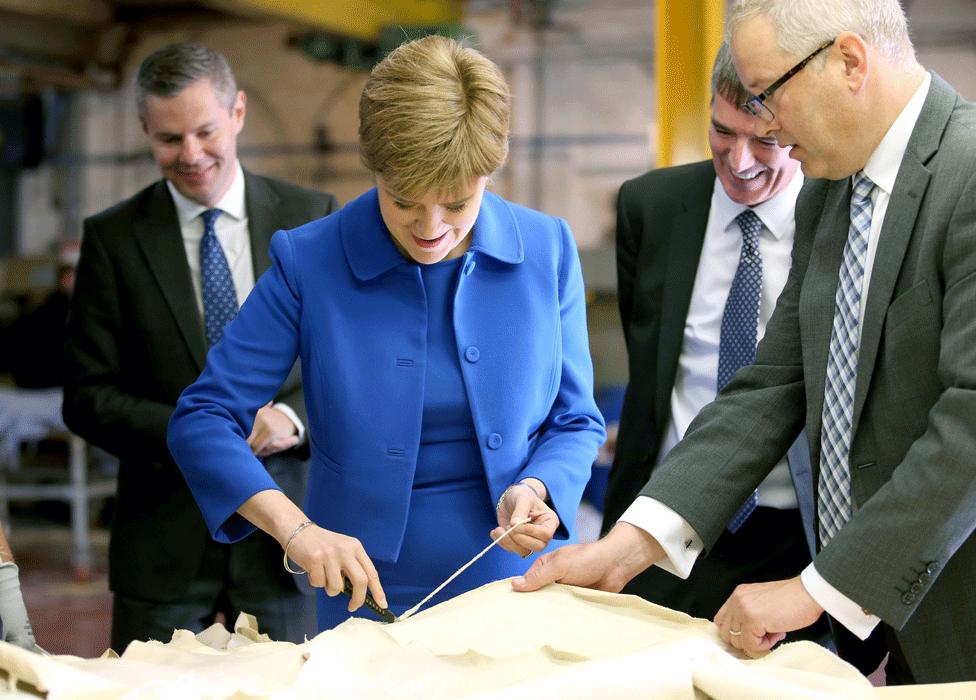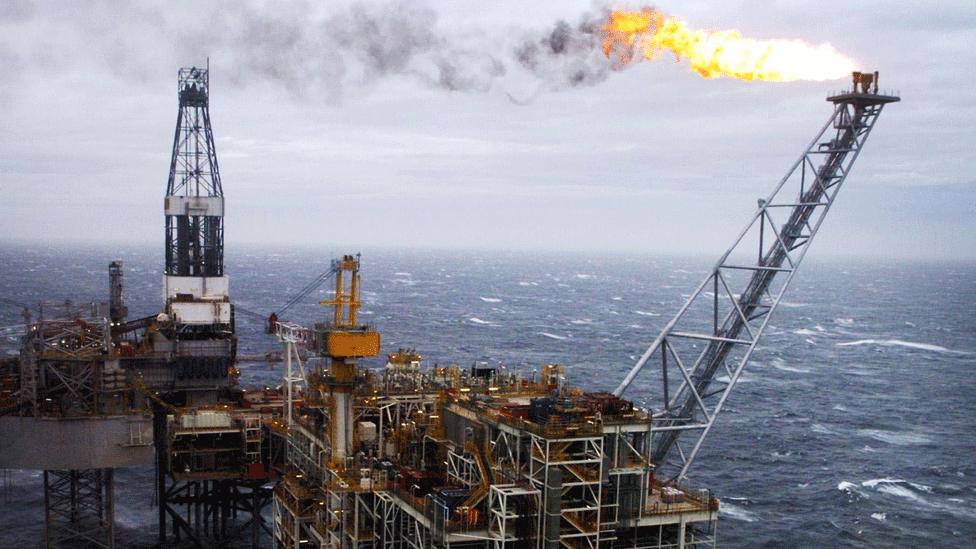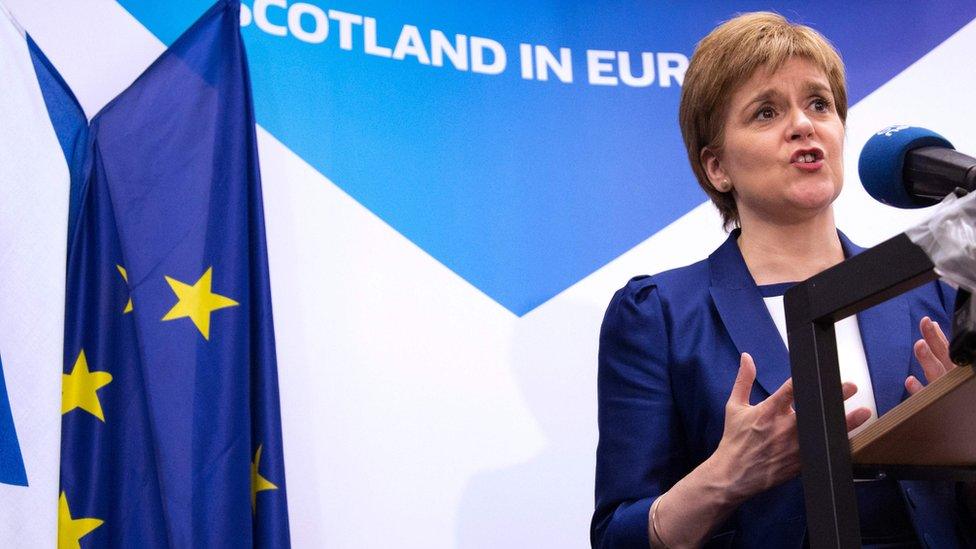GERS 2015-16: Confronting the challenges
- Published

First Minister Nicola Sturgeon is shown how leather hides are trimmed with managing director Colin Wade [right] looking on
The word of the day was "challenging". Nicola Sturgeon used it, repeatedly, when discussing the state of Scotland's economy, as partially disclosed by the publication of the annual exercise known as Government Expenditure and Revenue Scotland (GERS.)
I say annual. Actually, the last version emerged in March this year. Are we now to be subject to biannual visitations?
Apparently not. The Scottish government has simply chosen to accelerate publication of the latest batch of stats in order to make their information more "timely." That is "timely" in its modern meaning of "during the Festival when folk are still striving to make summer last".
But Ms Sturgeon was not the only one to feel challenged. The Scottish Secretary, David Mundell, also detected an incipient onslaught. In his case, the focus was upon Brexit. He reckoned that was enough of a challenge in itself, without the prospect of indyref2.
The First Minister launched the new, speedier GERS in the rather splendid Muirhead leather factor in the east end of Glasgow. An image of the whiskered founder gazed down upon her, looking slightly aggrieved. Perhaps, like the wicked media, he was trying to keep up with the blizzard of figures.
You'll find the details elsewhere, external. But, in essence, the slump in North Sea revenues has all but wiped out an increase in onshore tax take in Scotland, leaving us with a sizeable deficit. The UK as a whole is also in the red but has seen a reduction, being less proportionately dependent upon oil.
To clarify slightly, the deficit including oil is now £14.8bn. The 2015 figure published in March was £14.9bn. But that figure has itself now been revised to £14.3bn. Hence the deficit, including oil, is said to have increased slightly, again by contrast with an improving picture in the UK as a whole.
At which point, Andrew Muirhead's frown appeared, to this observer, to become discernibly sterner.

Augustine of Hippo, Christian theologian and philosopher, and patron saint of brewers, printers and theologians
In an effort to lighten the atmosphere, I asked the FM about her government's neo-endogenous economic growth theory.
Was she, I inquired, committed to reducing or even eliminating the deficit? There was just a touch of Augustine of Hippo about the reply. Economic virtue was to be sought but, perhaps, not just yet.
Ms Sturgeon agreed with me that tackling a deficit involved three potential factors;
grow the economy and so increase revenue
increase tax
and cut spending.
The focus of the FM was very, very firmly upon the first. Not tax, not spending.
Consider tax. In the recent Holyrood election, Ms Sturgeon ruled out increasing the standard or upper rates of income tax while curbing the Chancellor's proposed increase in the upper rate threshold in order to levy more from the highest earners. Council tax for those houses in Band Posh is also set to rise.
Her administration remains committed to reducing or eventually abolishing Air Passenger Duty when it is devolved. Earlier talk of a 3% cut in corporation tax, if and when devolved, has now been sidelined.
Business organisations - as witness Scottish Chambers today - continue to urge tax relief in order to encourage investment and so stimulate the economy. We will hear more on these matters when the Scottish Budget is published late this year or early next - but the intrinsic policy seeks balance.
And spending? Ms Sturgeon declined to countenance further constraint in Scotland - other than noting that there had been cuts in the cash available from the Treasury.
What about a second independence referendum?
But Scottish spending remains higher than in England, some £1,200 per person higher. Would she narrow that gap? It seems not. Ms Sturgeon said the spending lead was "right and sensible". It was driven by rurality and sparsity of population.
Which brings us back to that deficit - and economic growth. Ms Sturgeon said she continued to hope that there might be a revival in the North Sea - and urged UK policies to that effect. However, her emphasis was upon diversifying and strengthening onshore development. Brexit, she said, ran counter to that endeavour.
What does today's report say about independence? Everything, says the Scottish Secretary. Nothing, says the First Minister. Not much at all, suggest SG officials, who note - as they have in the past - that it is an arithmetical analysis "under different scenarios within the current constitutional framework."

Scotland's oil revenues are at £60m for 2015/16, reports GERS
Mr Mundell said it proved that Scotland, suffering from the oil slump, had benefited from UK support. Ms Sturgeon said that the GERS figures were in no way the starting point for an independent Scotland.
Still, those figures were, to use that word again, challenging. And it would seem that the position, relative to the UK, has worsened since the White Paper on independence, external was published.
Ms Sturgeon said that, over a five year period, Scotland had made a net contribution to the UK coffers. But, by dint of simple sums, it would appear that the precipitate decline in oil revenues - from £1.8bn last year to just £60m this year - means that factor is not currently present.
Another point, made by members of the wicked media in questions to the FM. EU rules provide that a member state should hold its deficit below 3% of GDP (under the Stability and Growth Pact) or face potential sanctions. (While still within the EU, the UK has an exemption from sanctions.)
Scotland's deficit is 10.1% of GDP sans oil and 9.5% with oil included. (The overall UK figure is 4%.)
Ms Sturgeon was unimpressed. Scotland's economy was fundamentally strong and would be recognised as such by the EU. In any case, she was attempting to remain within the EU, not to reapply. Another project she would undoubtedly characterise as challenging.
- Published23 August 2016
